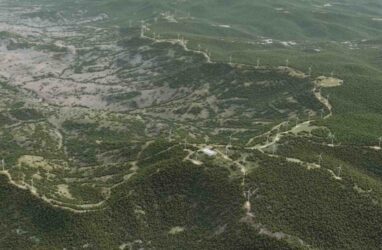Feed aggregator
Major Japanese power company announces nature-based carbon investment alongside LNG contract
Microsoft signs carbon removal offtake agreement with biochar producer
Japanese companies team up with regional governments to create forest-based offsets
NZ’s Climate Commission urges new govt to sort out ETS in final advice on second emissions budget
COMMENT: Westpac says no to deforestation – others will soon have to
Consortium seeks GHG acreage in Australia for CCS
Decline of rare UK bat linked to tree felling for British empire’s fleets
Rife deforestation 500 years ago aligns with western barbastelle slump, finds study of bat DNA
The examples of flora and fauna disappearing because of human excesses over the past 50 years are manifold, but research has found that the decline of a characterful bat began in the UK when its trees were felled for shipbuilding 500 years ago.
Experts from the University of Exeter and the Bat Conservation Trust (BCT) have concluded that a 99% drop in Britain’s western barbastelle bat populations began when trees were chopped down in the early days of Britain’s empire building.
Continue reading...Greenpeace takes oil and gas major to court over alleged carbon offset greenwashing
COP28 deal suggests days of fossil fuels are numbered – but climate catastrophe is not yet averted
 The overriding question the world now faces is whether the broad commitments nations agreed to are enough as climate change gathers pace. The answer, alarmingly, is no.
The overriding question the world now faces is whether the broad commitments nations agreed to are enough as climate change gathers pace. The answer, alarmingly, is no.
The post COP28 deal suggests days of fossil fuels are numbered – but climate catastrophe is not yet averted appeared first on RenewEconomy.
The COP28 climate agreement is a step backwards on fossil fuels
 Countries agreed to ‘transition away’ from fossil fuels, but oil and gas firms are ramping up production.
Countries agreed to ‘transition away’ from fossil fuels, but oil and gas firms are ramping up production.
The post The COP28 climate agreement is a step backwards on fossil fuels appeared first on RenewEconomy.
“Read the text:” Bowen’s warning to fossil fuel industry as COP finally embraces transition
 Bowen says COP28 agreement is a "big deal", with a clear warning to fossil fuels that the world is committed to transition to clean energy. But will it be quick enough?
Bowen says COP28 agreement is a "big deal", with a clear warning to fossil fuels that the world is committed to transition to clean energy. But will it be quick enough?
The post “Read the text:” Bowen’s warning to fossil fuel industry as COP finally embraces transition appeared first on RenewEconomy.
Men accused of killing 3,600 birds including eagles
CP Daily: Wednesday December 13, 2023
Hills of Gold: Contested New England wind farm wins planning approval
 One of the most contested wind projects in NSW wins planning approval from department, just the second wind project in five years in the state. But it still has another hurdle to jump.
One of the most contested wind projects in NSW wins planning approval from department, just the second wind project in five years in the state. But it still has another hurdle to jump.
The post Hills of Gold: Contested New England wind farm wins planning approval appeared first on RenewEconomy.
A23a: Monster iceberg just shy of a trillion tonnes
Name that whale! How AI aces animal spotting
Calls for tighter rules on biofuels imports to root out palm oil fraud
Investigations suggest a large share of ‘used’ cooking oil being imported could be wrongly labelled as demand outpaces supply
Tighter rules are needed to ensure that the imported “used” cooking oil that airlines hope will power cleaner flights is not in fact virgin palm oil, campaigners have warned.
About 80% of waste oil is imported to create biofuels that are mostly still used in cars, vans and lorries despite growing demand from aviation. About 60% of those imports come from China.
Continue reading...


